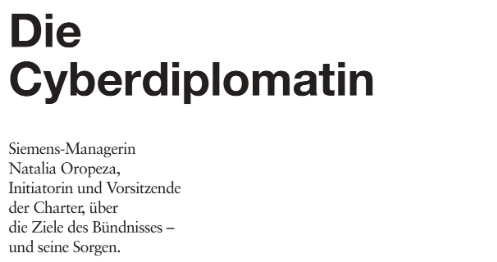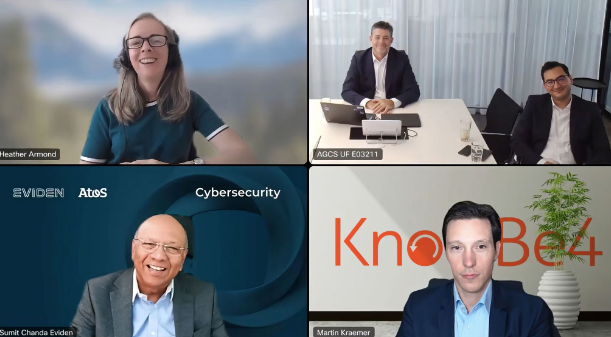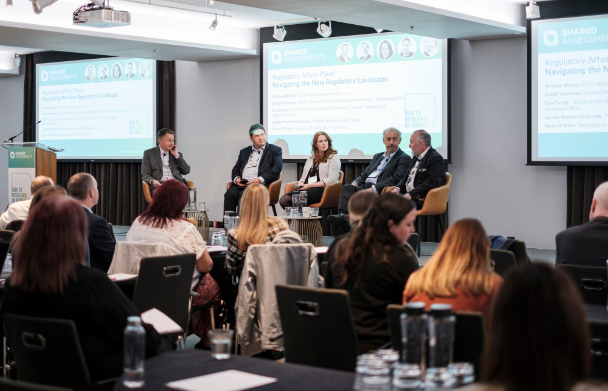As the United States begins a new chapter politically, this is an important moment for US leaders to evaluate and potentially reposition the nation’s cybersecurity policies. Cybersecurity should be among the top issues addressed first and consistently over the next four years.
This policy focus is essential as we continue to uncover and comprehend the impacts of the SolarWinds cyberattack. From bolstering the role of the US Cybersecurity and Infrastructure Security Agency (CISA) to taking critical steps to protect US infrastructure and supply chains to building a pipeline of advanced cybersecurity professionals, these critical policy areas must be central to the nation’s agenda going forward.
The members of the Charter of Trust – an international alliance of corporations and organizations committed to enabling trust in digital technologies – urge US government officials to align their policy priorities with several core principles that emphasize the need to prioritize cybersecurity laws, protections measures and education.
Ownership
Principle One of the Charter of Trust establishes that responsibility for cybersecurity should be appropriately designated throughout an organization with proper accountability in management. Aligned with that principle, we are encouraged by congressional action, via the recently passed National Defense Authorization Act (NDAA), which creates a “National Cyber Director” role within the White House.[1] We expect this new leadership role will pave the way for improved and streamlined threat intelligence with sharing of information across government agencies and with industry. This same legislation expands the role and responsibilities of CISA, a crucial step in protecting critical infrastructure in the United States. We anticipate that the new US administration will continue to encourage expansion of CISA resources, responsibilities and partnership with the private sector moving forward. These are all positive developments that will strengthen US national security as well as the security of the economy and critical infrastructure. We encourage government leaders at both ends of Pennsylvania Avenue to make cybersecurity an ongoing and sustained policy priority.
Supply Chain Security
Principle Two states that companies and – if necessary – governments must establish risk-based rules beyond the proposed Baseline Cybersecurity Supply Chain Requirements[2] to ensure adequate protection across the digital supply chain. For critical infrastructures such as the US power grid and other critical IoT solutions the Charter of Trust advocates for independent certification in its Principle Seven. As was observed in the recent high-profile SolarWinds attacks, third-party and fourth-party cyber risk management has never been more important. It is imperative for organizations to have visibility into the cybersecurity measures of their key vendors. Aligned to what we’ve developed in our white paper on supply chain security, the Charter of Trust is confident that CISA will continue and expand on its work as the nation’s cyber risk management advisor providing organizations with guidance and frameworks for assessing third-party risk. Tactically, this includes promoting standards across secure software development and engaging in a coordinated, improved approach to vulnerability management.
Education
Principle Six of the Charter calls on academia to expand dedicated cybersecurity courses in school curricula, helping to build a diverse talent base. There is a serious deficit in cyber talent pipeline, in large part due to the lack of educational opportunities. Additionally, there are known challenges in the cybersecurity field to properly identify, recruit and retain talent, especially women and minority groups. Meanwhile, estimates indicate there will be more than three million cybersecurity jobs unfilled just this year[3]. Recognizing the magnitude of the challenge, we encourage the administration to proactively address this shortfall through both creative and traditional means, including adjustments to immigration policy related to high-skilled cyber talent and providing dedicated funding to STEM education, especially in high schools and community colleges.
Security by default
Principle Three of the Charter calls for the adoption of the highest appropriate level of security and data protection, highlighting the need to ensure that security and data protection are preconfigured into the design of products, functionalities, processes, technologies, operations, architectures, and business models. As industrial production – especially in the technology and mobility sectors – continues to recover in the wake of the pandemic, security by default is now more essential than ever. We encourage and anticipate further discussion on device-based security standards – including the IoT Security Act of 2020 – when contemplating next steps in crafting more advanced, flexible cybersecurity principles.
International Norms and Leadership
Perhaps the most impactful cybersecurity actions government officials can undertake is to regain and reassert US leadership in cyberspace. We recognize that success will require global support and joint initiatives between industry, governments, academia and research organizations, as laid out in both Principle 10 of our Charter of Trust and its Joint Initiatives and Associate Partner Forum, which support a collaborative approach between these three important stakeholder groups. To also strengthen the global digital supply chain for the US industry harmonization of standards and requirements with other regions shall become a priority of the new administration.
Cybersecurity is at the core of national defense, future stability and economic growth. Its importance should not be underestimated or placed down the list of highest governmental priorities. The members of the Charter of Trust stand by to help inform and support these policy actions.
[1] Congressional backers cite cybersecurity provisions as they push Trump to sign defense bill – CNNPolitics
[2] Charter of Trust Baseline Cybersecurity Supply Chain Requirements
[3] The Mad Dash to Find a Cybersecurity Force – The New York Times (nytimes.com)


You may also like

Chairwoman Natalia Oropeza in Brandeins Magazine
In an interview with Dorit Kowitz, Natalia dives deep into the pressing issues facing the cybersecurity landscape, explaining how the Charter of Trust bundles the expertise of different businesses across several regions to stay resilient in the face of evolving threats. As Natalia Oropeza says: "We all win if cybercrime doesn’t win."
Here are three key insights from her interview:
🔑 Collaboration is essential: No single organization can tackle cyber threats alone. The Charter of Trust is a prime example that businesses nowadays are more transparent when it comes to attacks and that sharing information in this field can be beneficial.
🔑 Addressing the digital skills gap: The Charter of Trust is working to address the global shortage of cybersecurity professionals by encouraging diversity and actively promoting opportunities for women to join the field.
🔑 Unified regulations: Harmonizing global cybersecurity standards will reduce vulnerabilities, helping businesses and governments combat threats more effectively.
The full interview is available here: https://lnkd.in/gRm6ZDGC


Cybersecurity Awareness Month
The complexity and urgency of this topic gathered a lot of interest, with 600+ attendees throughout the whole panel, which was composed of Jon-Paul Jones, COO at AZ Commercial, Firas Ben Hassan, GenAI expert & Manager of AllianzGPT at AZ Technology, Dr. Martin J. Krämer, External Security Awareness Advocate at KnowBe4, and Dr Sumit Chanda, Global CISO at Eviden & Chair of the Global External Engagement Working Group at the Charter of Trust.
We are pleased to see Dr. Sumit Chanda from Eviden bringing in his unique CISO insight on what these emerging technologies mean in day-to-day cybersecurity practices and bringing in the Charter of Trust perspective on this topic as well.
Thank you, Ervin Cihan and Haydn Griffiths for inviting other CoT Partners and for the great initiatives that Allianz is putting together within this year’s Security Awareness Month. And special thanks to Heather Armond for the great moderation.


UK/EU Summit - “Risk to Resilience”
💡Under the theme “Risk to Resilience” the first event of this series was held in London and brought together professionals from different industries and regions. Detlef participated in the panel about the complex regulatory landscape and emphasized that new legislation like the EU AI Act, DORA and Hashtag#NIS2 continue to push the standard of care on cybersecurity and other risks.
Thanks to Shared Assessments for organizing such an amazing event and inviting the Charter of Trust to participate in this high-class panel alongside Andrew Moyad, CEO at Shared Assessments.



